U.D.O. making itself known in the U.S.A.
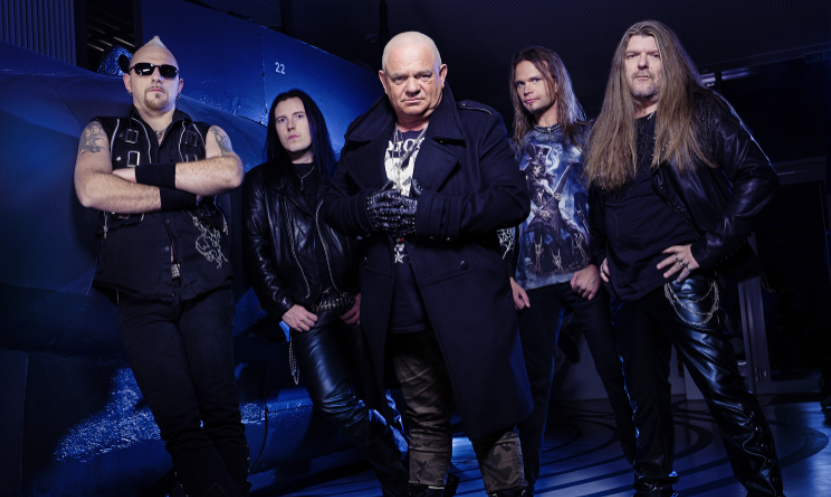
61-year old, heavy metal frontman Udo Dirkschneider is best known in America as the original voice of the band Accept. The band Dirkschneider has fronted for more than 25 years, U.D.O., is popular in Europe but has never made its mark stateside. But that may change. With new representation and management focused on America, U.D.O. arms itself with a powerful new album, Steelhammer— fresh with new guitarists Andrey Smirnov and Kasperi Heikkinen (longtime U.D.O. guitarist Stefan Kaufmann left due to health problems). After finishing up a short, successful American tour this year, and having Steelhammer land on the U.S. Billboard Charts for the first time at #107, Udo Dirkschneider is feeling very enthusiastic.
The following is a Powerline interview with Udo Dirkschneider:
You must be excited about Steelhammer?
Udo Dirkschneider: I think the response of this album is fantastic and that means we did something right (laughs).
It opens up with the title track that’s certainly metal but it has a modern, futuristic sound, too.
Dirkschneider: Yeah, but I think it is also about the new guitar player Andrey Smirnov. He was doing all the guitar work on this album, and he plays classic metal but with a modern style. The sound he has on the amplifier cabinet, is in a way, modern.
 One thing that really stuck out is his guitar playing.
One thing that really stuck out is his guitar playing.
Dirkschneider: Yes, I know (laughs). He’s very young. He’s 29 years old and when he came for an audition, it was not planned that he was doing a whole album. He came to Germany for an audition and we said just play the one new song off the album and he did all [the songs] on the album, and I think he did a fantastic job.
Is it strange working with someone so much younger? Is there a generation gap? Or did Andrey just fit in?
Dirkschneider: He just fit in. I mean, there’s no problems about generations. We’re talking about music and that’s easy.
I guess, when you have to tour together, a person becomes like a family member almost.
Dirkschneider: Yeah, when we did a small tour in U.S. and Canada he fit perfectly. And also the other new guitar player, Kasperi Heikkinen. He came from Finland and he came in after the whole album was already done. These two guys are working well together. The whole atmosphere in the band is like a real family going on and it’s good to have young blood in the band. It keeps me also young (laughs).
View Powerline photo gallery of U.D.O.’s latest U.S. tour
You sound rejuvenated.
Dirkschneider: What can I say? I mean, it was not easy after Stefan Kaufmann had to leave the band because of his health problem — after working for 30 years with Stefan Kaufmann and writing songs with Stefan Kaufmann together. He was the producer of U.D.O.. Then he said, ‘I need a break. I am not in the mood to compose songs or do a production for U.D.O. at the moment.’ And that was for me, like, ‘Oh what can I do?’ Then I start writing songs with Fitty Wienhold, the bass player, and it worked out very well. And in the end we were writing the whole album together. And also production-wise, this was another thing. We said ‘Who will be the producer?’ And I called up my old friend Michael Wagener. He was, of course, the first guy I had in my mind. I said, ‘Michael, can you produce the new album of U.D.O.?’ And he said ‘Yes, why not? I’d love to do this.’ And then he said ‘When?’ and I said ‘Now!’ (laughs). But the problem was he very busy with Lordi. He said to me ‘Udo, why are you not doing this on your own?’
The albums sounds so polished.
Dirkschneider: I think in a way I’m really lucky to have found the right people at the right time. Andrey was the right choice. And everyone said ‘A Russian guy? He can be a problem.’ But he’s not a problem. He’s very open-minded about everything. And I’ve been so many times in Russia, you know.
How can you turn a guy like that down?
Dirkschneider: What I really like is that both new guitar players are working really well together on all the new songs. At the moment, I’m very enthusiastic about everything. I really look forward to go on tour with these guys. We do a three-month tour here in Europe, Russia for a long tour, and then we keep going until the middle of December. And next year, I know they’re already working on the next U.S. tour — but a longer one — like six or seven weeks. And I’m looking forward to coming back to the U.S.
How do you find the American audiences different on this last tour?
Dirkschneider: Well, the last time I was in America was about 12 years ago and I was really surprised. They’re really enthusiastic and they’re really singing along. Yeah, I think it’s a different generation in a way. I don’t know. But it’s a change for me to see that people are really enthusiastic. Normally, when I remember the old days, they were not that enthusiastic at the shows.
I saw the first shows when Accept came to America and I know I was very enthusiastic (laugh).
Dirkschneider: Yeah, that was a long time ago (laughs). I mean, that was really something else. We started at first a tour together with KISS. That was an amazing tour and KISS was really friendly to us. They told us how to act onstage in America. America was a little different at the time than Europe. In America it was a little bit more entertainment and stuff like that. We learned a lot from KISS. Really nice guys.
Getting back to Steelhammer — it came out sounding so well. Do you think it will be hard to reproduce live?
Dirkschneider: No. But, for example, “Book of Faith,” this song, it is not possible to play this live. Then you’d need an orchestra at the end. A song like “Heavy Rain,” there’s a piano but you can also play the piano [part] with an acoustic guitar. Of course, we have underneath some keyboards in some songs but you can play the song as well without keyboards. We really care that we can say ‘Okay, on the album we can put underneath some nice atmosphere with keyboards’ but we also have in mind that we can play this song also live. That’s very important.
What I meant, too, is take the song “Metal Machine.” — it has such a unique guitar sound to redo live.
Dirkschneider: That’s no problem. That is the sound of Andrey. We played “Metal Machine” already many times at festivals and [on] the American tour. So it works really well.
The last album was considered modern sounding. How do you compare Steelhammer to that album?
Dirkschneider: Let’s say it this way, I don’t want to say anything bad against Stefan [Kaufmann], you know, but for me the Rev-Reptor album was a little bit cold. But Stefan was really much into computers. So, what I did now is have musicians facing us in the studio, using real amps, cabinets, drums, everything. It’s a more live feeling and I think you can hear that humans are playing the songs. And I think that’s the difference between Rev-Raptor and Steelhammer.
Were you a little apprehensive finding a new songwriting partner?
Dirkschneider: Yeah but Fitty Wienhold was already doing some songs like “Rev-Reptor,” “I Give as Good as I Get” … He was already doing a lot of good songs for U.D.O. I said ok , Fitty, let’s give it a try and see how far we can go, and in the end we wrote the whole album together and it works perfectly.
It really has. The strength of the songwriting shows.
Dirkschneider: Yeah, I’m already looking forward to the next album. I already heard some good stuff from the new guitar players. It will be interesting working with them as songwriters.
I read a quote from you that when you write songs you really don’t think ‘Let’s write Heavy Metal.’
Dirkschneider: Yeah, we just write songs. I mean, of course metal’s coming out (laughs) but I never sit there and say ‘Okay. We have to do it like this and this.’ We just keep going and see what comes up. I think on Steelhammer we have a lot of different kind of stuff — from a really fast song like “Death Ride” to “Heavy Rain.” There’s everything on it.
Were the guitar riffs already written by the time Andrey came into the band?
Dirkschneider: Yeah. Everything was already written. But after two days in the studio he would say ‘Can I change this a little bit?’ He came up with really good ideas, you know, to change some parts. And that was really interesting to see. And he did a good job.
And you went through about 300 guitar demos?
Dirkschneider: Yeah. It was a nightmare (laughs).
But, you know, in the end you picked the right guys.
Dirkschneider: In the end we had four guys left. We had Andre, Kasperi, we had a guy from Norway, and a guy from Germany. Normally, it was just to replace Stefan Kaufmann. And I didn’t want to have the same [kind of ] guy as Stefan, a guy who played the same stuff, so I wanted to have the opposite and that was Andrey, definitely. And then Igor [Gianola, guitarist] left the band. Why, after 15 years? He had a big time problem [that] U.D.O. is getting more popular, more tours and it was too much for him. I didn’t understand it, but, okay, what can you do? So we had to look for a second guitar player and that was not planned. And in the end we took Kasperi from Finland and that was also the right choice. Now we have two brilliant guitar players. What can I say?
Kasperi didn’t get to play on the new album, correct?
Dirkschneider: No. He came when the album was already completely finished.
I’m sure the fans will be excited to hear his playing, too.
Dirkschneider: Yeah, that’s why I said already I’m really looking forward to the next album (laughs). He also has some brilliant ideas. I am really lucky to have found these two guys. Yep, and here we go!
And, Udo, how is Stefan doing?
Dirkschneider: I think he is producing a band from Switzerland. And I think after he left U.D.O. he again had problems with his back, but now it’s much easier for him and I think he will just work at his studio. As far as I know everything is alright. I think in July we will have a dinner together, then we’ll talk together, maybe about the future. I mean, we are way open-minded. I say to Stefan, okay, if you feel you want to write songs for U.D.O. or come up as a producer again, the house is open, you know. And we will see what he will do in the future.
Well, I mean, you guys have been together for so long.
Dirkschneider: Oh yeah. For a very long time.
It’s probably like you can almost read each other’s minds, you know.
Dirkschneider: Yeah, it’s like I had been married to this guy (laughs). I’ve known Stefan since he was 18 years old. A real long time. But what can you do? For me it’s more important that I don’t see him in a wheelchair, you know.
Yeah, touring can already be a grueling process.
Dirkschneider: Yeah, and you know when we did the Rev-Reptor album, we had to stop for three months. He couldn’t move. And that was a really bad thing. We were already thinking at this time maybe it’s better to stop being on tour with us. He said no and then he was fine after awhile but then the real problem came up on tour. He had to take really heavy pills. You could kill an elephant with those, you know, and he could not really move on stage. Always, you know, he had so much pain, I know it. He was really never showing this but if you’re so long together with somebody, you know what’s going on. If you have always pain, then you’re not always in a good mood, you know. He started shouting, he was always in a bad mood and the whole atmosphere was going down in the band, and that was also another thing. Then I said, “After the Rev-Raptor tour, Stefan, I think we better stop.” And then he said in the end to me ” You are right.”
Do you find that as you get older, touring is more of a grind?
Dirkschneider: No. For me, no. I feel fine. For me, there’s no problems. I don’t have any problems with my voice. I think I’m really lucky. I don’t have any health problems. We always do shows over two hours here in Europe, I mean, there’s no problem, I do five or six shows in a row.
And your voice hasn’t changed at all.
Dirkschneider: Also lucky (laughs). I do nothing special. The only thing that I did was, over eight years [ago] I had stopped smoking. And, I mean, I never warm up before I go onstage.
Has quitting smoking helped?
Dirkschneider: Oh yeah. I mean, I feel more comfortable. Your taste getting better. You can breathe much better. Yeah, it helps in a way.
As far as the lyric writing — did you write most of the lyrics on the new album?
Dirkschneider: Yeah. I have tons of hook lines, you know. I have all these stories, you know. I write stories down and I see what is coming up music-wise and see if a story can fit into a song. And I also work together with Fitty but the stories most of the time come from me. It’s so easy to write lyrics with what’s going on right now in the world. If you sit and watch the news for one day I think you’ll have enough ideas (laughs).
And the song “A Cry of Nation” has that to it.
Dirkschneider: The story is that we have no middle class anymore. The rich people getting richer, and we have a lot of poor people, you know, and all the people from poor countries are now moving into [another] country, they think that there’s some money. So that is in a way the story of the cry of a nation.
Economically, it’s becoming very strange.
Dirkschneider: Yeah, I know. I live here in Spain — now for five years — and the whole financial crisis going on in Europe is not only Spain but that’s why I was singing a song in Spanish — that’s “Basta Ya.” That story is about the financial crisis in Europe, And “Basta Ya” is like “We had enough of all this,’ you know. I try to have stories and lyrics about what’s going on in the world. Of course, we have some lyrics, for example like “Steelhammer,” about our music, our lifestyle — the heavy metal lifestyle, you know. I also have songs like “When Love Becomes a Lie” — it’s a private thing with me. You know, my wife left me after 25 years, blah, blah, blah (laughs), so there’s private stuff, too. But real stuff, you know, not only demons and witches and dragons. That’s not really what I want to do.
Is heavy metal popular in Spain?
Dirkschneider: Oh yeah. Heavy metal is very popular in Spain. You can tour here for one month if you want. Yeah, it’s a big thing here in Spain.
Were you pleased with all the recent reissues of U.D.O. albums [in America]?
Dirkschneider: Yeah, I mean it was important, especially for the U.S. We never had a real proper record company in America. That was also the reason why we were not touring in America for a long time. There was no backup but now we have our German record company open up a distribution label. We have a guy working for us in America — management, booking agency and on and on, so now it’s the time to say, okay, let’s see what going on for U.D.O. in America. So we had a short tour and everything went really well.
Read a Powerline review of a recent U.D.O. reissue.
More people should be aware of U.D.O. in America
Dirkschneider: Yeah, so the result is that now well come back for a long tour and I am really looking forward to this.
Between U.D.O. and Accept you have almost 25 studio albums.
Dirkschneider: In a way, it is a lot of stuff (laughs).
There must be a favorite U.D.O. album or one that you think is a time capsule for you.
Dirkschneider: There was a very important album I think for U.D.O. that was definitely Faceless World. It was the first time we were using keyboard but in a different way. Another important album completely different than Faceless World was the Timebomb album, so … but I think now with Steelhammer … it’s for me, at the moment, one of the best U.D.O. albums. I think we put everything together on this album.
It is true. It might be one of the best.
Dirkschneider: Yea, a lot of people say this is really like an album that is one of the best U.D.O. albums ever. That’s what people say. That’s not coming from me, you know. And that’s very interesting to hear. And that means, as I said already, we did something right.
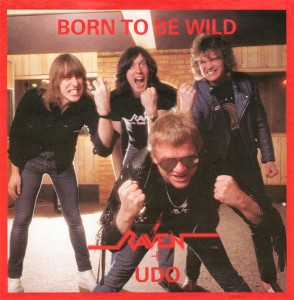 I was going through some old albums the other day, I found the 45 you had done with Raven, “Born To Be Wild.” That’s great little single right there.
I was going through some old albums the other day, I found the 45 you had done with Raven, “Born To Be Wild.” That’s great little single right there.
Dirkschneider: “Born to Be Wild,” that was just a jam session, you know. We had a lot of beers in the studio when we were producing Raven and Michael [Wagener] was for some reason was pushing the record button. That’s it (laughs). Life in the studio.
Do you still keep in touch with some of those old bands like Raven?
Dirkschneider: Oh yeah, I mean, sometimes we meet each other on festivals and still we talk about all these old days and they’re really still funny those guys.
And, to end it, aren’t you glad I didn’t bombard you with any Accept questions? It seems like you get a lot of those.
Dirkschneider: Yeah, let’s say this is history. Let’s say it this way (laughs).

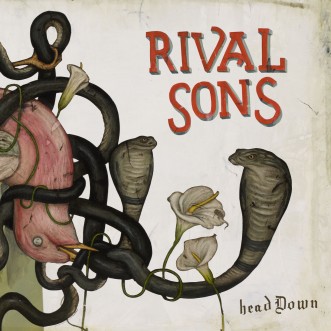
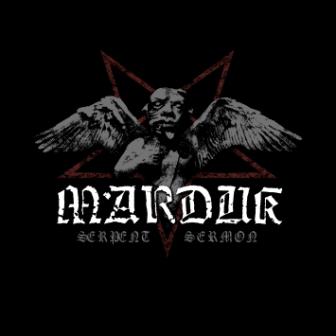
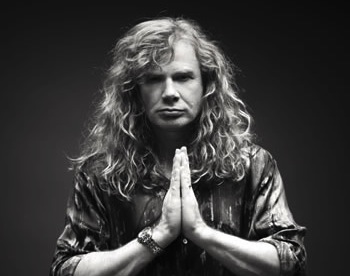
The new Steelhammer cd is excellent. If you love REAL Heavy Metal, this is the cd to get. It is easily the BEST cd of the year. It’s hard to believe that at his age, Udo continues to put out music at such a level of quality. This cd completely blows away anything Accept has ever done. I guess the one question never asked was exactly who played guitar on the cd?
I guess what I want to know is who wrote the music and what guitarists performed the music on the cd.